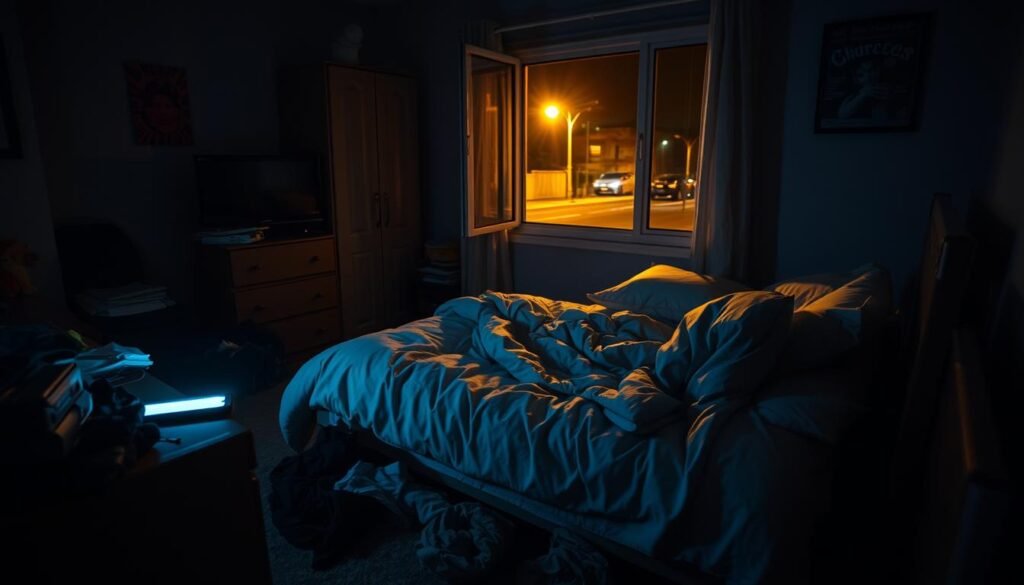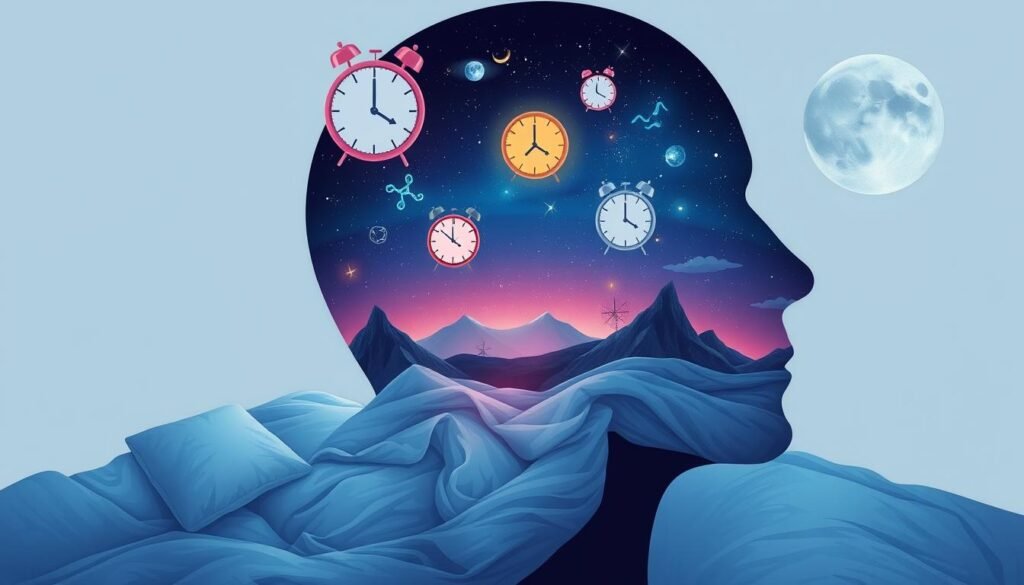Insomnia is more common than you might think, affecting about 35% of adults. It means lots of people have trouble sleeping or staying asleep. This results in feeling tired all the time and having mood swings. It’s key to know the causes of insomnia to find good ways to sleep better.
Short-term insomnia is usually because of stress or big changes in life. But, if it lasts more than three months, it might be due to health issues or medications. Stress, worry, the environment, or bad sleep habits can all cause insomnia. To learn more about insomnia, you can check out this detailed guide. Knowing the different causes helps in finding ways to sleep well again.
Key Takeaways
- Insomnia affects approximately 35% of adults, making it a widespread issue.
- Stress, anxiety, and depression are among the common causes of insomnia.
- Chronic insomnia can persist for months or even years.
- Improving sleep hygiene is crucial in managing sleep disorders.
- Environmental factors like noise and room temperature contribute to insomnia.
- Cognitive Behavioral Therapy for Insomnia (CBT-I) has been shown to be effective.
Understanding Insomnia and Its Impact
Insomnia is a condition that many people face. It affects women and older adults more often. The outcomes are not just limited to sleepless nights. They also include decreased energy and more irritability, which harms sleep health.
Stress and emotional distress can increase the chance of having insomnia. This condition can cause daytime sleepiness and trouble focusing. It greatly affects one’s performance at work or school.
Lower income individuals and night shift workers are more likely to have insomnia. They face disrupted sleep patterns. Studies show African American individuals have poorer sleep quality than their White peers.
Sleep disturbances can lead to serious health complications, including obesity and high blood pressure.
It’s crucial to understand how insomnia affects our lives. Making a regular sleep schedule and looking at lifestyle choices can help. Trying cognitive-behavioral therapy (CBT) might also improve sleep health and reduce insomnia symptoms.
| Factor | Impact of Insomnia |
|---|---|
| Energy Levels | Significantly reduced |
| Mood | Irritability and anxiety |
| Cognitive Function | Poor concentration and memory issues |
| Daily Performance | Impaired work or school performance |
| Health Risks | Higher risk for obesity, depression, and hypertension |
Insomnia Possible Causes
Understanding insomnia’s roots is key to treating it right. Stress and anxiety are top reasons why people can’t sleep well. These mental issues greatly affect how well you sleep, causing problems over time. Medical conditions can also make insomnia worse. It’s crucial to see how our bodies and minds work together in sleep issues.
Stress and Anxiety
Stress and anxiety often cause sleepless nights. Worries about work, love, or money may keep you up. Disorders like generalized anxiety or PTSD can make it hard to sleep too. People with depression also struggle more with sleep. We must tackle these mental health issues to sleep better.
Medical Conditions
Many medical problems disrupt sleep too. Diseases like heart issues, diabetes, and chronic pain affect night rest. About 55% with stomach problems have insomnia. It’s even more common in pregnant women, affecting 78% of them. Some medicines for allergies or high blood pressure can also mess with sleep. Understanding these factors helps us find ways to improve sleep.
| Condition | Impact on Sleep |
|---|---|
| Stress and Anxiety | Increases likelihood of insomnia, leading to prolonged sleep disruption |
| Depression | Significantly raises risk of sleep disturbances |
| Gastrointestinal Problems | 55% report insomnia compared to 20% without issues |
| Chronic Illness | Exacerbates discomfort, leading to frequent awakenings |
| Medications | Can contribute to insomnia symptoms, complicating treatment |
Sleep Deprivation Symptoms
Knowing the signs of sleep deprivation is key to understanding insomnia’s challenges. Insomnia’s effects change how we function every day. By knowing these signs, people can get better at dealing with sleep problems.
Common Symptoms of Insomnia
Those with insomnia often face many symptoms. These include:
- Difficulty falling asleep
- Frequent awakenings during the night
- Feelings of tiredness upon waking
- Drowsiness throughout the day
- Problems with memory and concentration
Recognizing these signs helps understand sleep issues better. Early awareness of these signs can prevent worse problems later.
How Insomnia Affects Daily Life
Insomnia’s impact goes far beyond just sleep. It affects daily activities. People might notice:
- Reduced productivity at work or school
- Increased irritability and mood swings
- Heightened anxiety or depressive symptoms
- Strained personal relationships
- Impaired physical health, including a weaker immune response
A lot of people over 65 struggle with sleep, leading to bigger issues over time. Sleep problems can lead to health risks like depression and mental illness. Knowing insomnia’s impact is important for overall health.
Poor Sleep Hygiene and Its Role
Poor sleep hygiene can really affect how well you sleep. About one third of adults don’t get enough rest. This is due to bad sleep habits. Things like using your phone before bed or not having a sleep routine are big factors.
Most adults need 6 to 9 hours of sleep to feel good. Kids need even more sleep. It’s key to start good sleep habits early on. Doing things like eating late or doing exciting activities can make it hard to fall asleep. If someone has insomnia, they might struggle to sleep well for months. This can really affect their daily life.

To sleep better, making some changes can help a lot. Here are some tips that can make a difference:
- Try to go to bed and wake up at the same time every day.
- Stop using screens an hour before bed.
- Avoid caffeine, nicotine, and alcohol at night.
- Have a calming bedtime routine, like reading.
- Make sure your room is quiet, dark, and cool.
These sleep hygiene tips might not fix insomnia for everyone. But they can help you develop better sleeping habits. By following these tips, you can improve your sleep quality. And that can make a big difference in dealing with insomnia.
The Influence of Diet and Lifestyle Habits
Diet and sleep go hand in hand, with lifestyle habits being crucial for good sleep. Knowing how certain foods and eating times affect sleep lets people make better choices. This can lead to improved sleep each night.
Caffeine, Alcohol, and Nicotine
Caffeine can greatly affect sleep, especially if taken two to three hours before bed. It can make falling and staying asleep hard. Caffeine keeps you alert, which is bad news for those with sleep issues.
Alcohol might seem to help at first, but it actually worsens sleep quality later on. Nicotine is another culprit that disrupts sleep. Staying away from these substances in the evening can make a big difference in sleeping well.
Eating Patterns Before Bed
What you eat before bed matters a lot to your sleep health. Large or rich meals can keep you awake because they take longer to digest. It’s good to eat light and not too late to avoid this.
Lacking certain nutrients can also ruin sleep quality. Foods high in tryptophan, like turkey and cheese, can help. Eating at consistent times every day helps keep your body in rhythm, aiding in better sleep.
Hormonal Imbalances and Sleep
It’s key to understand how hormonal imbalances affect sleep. Hormone changes can mess with sleep, especially for women going through things like periods and menopause. Hormones like estrogen, progesterone, and melatonin play big roles in sleep quality.
Effects of Hormones on Sleep Patterns
Hormonal imbalances can mess with your sleep a lot. For example, melatonin, which we need for sleep, spikes at night. But, estrogen and progesterone don’t peak like that, leading to insomnia for some. Research notes that 42% of women before menopause have sleep issues. Also, less melatonin is made as people get older, making it harder for them to sleep.

Insomnia During Menstrual Cycle and Menopause
Women often notice sleep problems linked to their menstrual cycle and hormone changes. Those with premenstrual syndrome might have more sleep trouble due to changing hormone levels. Sticking to a sleep schedule can help. Birth control pills might also stabilize these hormones. Menopause can cause sleep-disrupting hot flashes for about two-thirds of women. Studies show menopausal women with sleep issues often get better with estrogen therapy. Knowing how hormones and sleep affect each other is crucial for handling sleep problems during these times. For extra info on hormonal sleep problems, visit this link.
Sleep Disorders That Cause Insomnia
Understanding sleep disorders is key to tackling insomnia and bettering sleep quality. Two main conditions, Sleep apnea and Restless Legs Syndrome (RLS), can cause long-term insomnia.
Sleep Apnea
Sleep apnea involves breathing pauses during sleep. These pauses wake people up often, disrupting their sleep. People with sleep apnea may feel very sleepy during the day and have trouble focusing.
This condition affects more older adults and can run in families. If a family member has it, your risk might be higher.
Restless Legs Syndrome
Restless Legs Syndrome leads to uncomfortable feelings in the legs. This urge to move can prevent falling asleep or staying asleep. It’s a key topic when talking about insomnia.
RLS can get worse due to lifestyle or other conditions like anxiety and depression. These issues also disturb sleep. Treatment can help, but RLS significantly affects one’s life.
Environmental Factors Affecting Sleep
Many things in our environment affect how well we sleep. Noise and light pollution are top disruptors of a good night’s rest. Knowing about these can help us make our bedrooms more peaceful.
Noise and Light Pollution
Loud sounds can break into our deep sleep phases. High noise levels, especially in cities, make us wake up more often. Green spaces, however, can bring calmness and reduce insomnia. Light pollution messes with our body’s sleep cycle too. Keeping our bedrooms dark and quiet at night is key to sleeping better. For detailed information, visit this resource.
Comfort and Temperature in the Bedroom
The feel of our sleeping space is crucial for deep sleep. A not too hot, not too cold room and comfy bedding help us sleep well. Studies show that cooler bedrooms encourage a deeper slumber. Making sure everything in our bedroom promotes relaxation can lessen sleep troubles. Homes that balance comfort right tend to support longer sleep and better health.

Travel and Work Schedule Disruptions
Travel often messes with our sleep, especially when crossing time zones or working odd hours. Knowing how jet lag and shift work affect us can help overcome sleep problems. It’s key to find ways to deal with these issues.
Jet Lag Effects
Jet lag hits hard, particularly when traveling east. Studies show about 75% of travelers feel worse jet lag in this direction. It can mess with sleep for weeks as our body clocks try to catch up.
On the first night in a new place, many experience poor sleep. This makes adjusting even harder. Short-term sleep loss from travel can lead to slower thinking, feeling sleepy during the day, being easily annoyed, having less energy, and a higher chance of accidents.
Travel also often means more drinking and less exercise. These changes can make jet lag worse and upset our sleep even more. Frequent travel with poor sleep might increase the danger of serious health issues like heart disease and diabetes.
Shift Work and Its Challenges
Shift work disrupts regular sleep patterns. People with jobs in nursing, firefighting, and flying often work at odd hours. This messes with their natural sleep cycles, hurting sleep quality and causing tiredness and sleep issues.
Big problems with shift work include not sleeping on a regular schedule, feeling more stressed, and a higher chance of not getting enough sleep. Working weird hours can lower how well we do at our jobs, in sports, or during leisure time. Getting why this happens is important. It helps us find ways to sleep better amidst travel mess-ups and tough work schedules.
Medication Side Effects and Insomnia
Many adults struggle with insomnia. It is often due to the medications they are taking. Knowing which medications can cause sleep problems is key. This knowledge helps in dealing with insomnia properly.
Common Medications Linked to Sleep Issues
Several drugs can make sleeping hard. The usual suspects include:
- Antidepressants: SSRIs can lead to insomnia.
- Heart Medications: Alpha-blockers, beta-blockers, and ACE inhibitors may cut down on REM sleep. This can make you feel sleepy during the day.
- Corticosteroids: These can make you feel more awake than sleepy.
- Statins: Often for cholesterol, they might cause muscle pain. This can disturb sleep.
- Cholinesterase inhibitors: For Alzheimer’s, these may cause sleeplessness or nightmares.
- Theophylline: An asthma drug that can disturb sleep.
- Non-Drowsy Antihistamines: In cold meds, they might lead to anxiety or jitteriness. This impacts sleep.
- Pain Medications: Some have caffeine, which messes with sleep.
- Stimulant Medications: For ADHD, these often cause insomnia.
- Opioids: They can mess up the natural sleep cycle.
| Medication Type | Sleep Effect |
|---|---|
| SSRIs | Can cause insomnia |
| Alpha-blockers | May reduce deep REM sleep |
| Corticosteroids | Induce feelings of energization |
| Statins | Can cause muscle pain |
| Cholinesterase inhibitors | Can lead to nightmares |
| Non-drowsy antihistamines | Can induce anxiety |
Managing Medication Effects
It’s essential to know how drugs impact sleep. Working with doctors to check your meds is a good step. Changing when you take your meds or their doses can help. You might also try natural sleep aids, or make changes to how you live and where you sleep.
- Taking medications earlier in the day
- Adjusting dosages based on individual responses
- Considering natural sleep aids that do not interfere with other treatments
- Implementing lifestyle changes to enhance sleep hygiene
- Making adjustments in the bedroom environment to promote better sleep
With a good understanding of how drugs affect sleep, people can find better insomnia treatments. This can lead to more restful nights.
The Connection Between Mental Health and Insomnia
Mental health challenges greatly affect how we sleep. There is a tough link between conditions like anxiety, depression, and insomnia. If you’re anxious, you might find it hard to sleep well. This can make depression harder to handle. To get better, we need to look at both issues together.
Anxiety and Depression as Triggers
Around 25 million Americans face insomnia every year, often linked to mental health challenges. Astonishingly, over 90% of people with depression also struggle with sleep. This shows how common it is for these problems to appear together. For example, folks without depression but with insomnia are way more likely to get depressed later. And those who are depressed are similarly likely to face insomnia.
Therapeutic Approaches to Improve Sleep
Cognitive Behavioral Therapy for Insomnia (CBT-I) is an excellent therapeutic choice. Around 70% of those who try CBT-I see better sleep. This therapy works on changing thoughts and actions that ruin sleep. Often, it’s even more helpful than pills and has fewer bad effects.
| Condition | Insomnia Presence (%) | Common Symptoms |
|---|---|---|
| Clinical Depression | 90+ | Sleep disturbances, fatigue, low mood |
| Anxiety Disorders | 60-66 | Difficulty falling asleep, restlessness |
| PTSD | 50-70 | Nightmares, hypervigilance |
| Schizophrenia | 80 | Early and middle insomnia, fragmented sleep |
Understanding the connection between mental health and sleep issues is key. Addressing both together can improve how we manage insomnia and mental illness.
Conclusion
Insomnia is a big problem, affecting about 30% of adults. It does not just ruin our nights but also our days, impacting work and health. Knowing more about insomnia shows us why it’s vital to understand sleep issues fully. It’s important for everyone to realize how crucial sleep is for our health.
There are many reasons why people can’t sleep, from daily habits to health issues. By fixing our sleep routines and handling stress, we can sleep better. Avoiding things like coffee before bed is also a key step. Making these changes can greatly boost sleep quality and health, especially for those with ongoing sleep problems.
Effective strategies and professional advice are key to beating insomnia. Cognitive Behavioral Therapy for Insomnia (CBT-I) has proven helpful, showing the need for personalized solutions. By adopting such strategies, we move closer to better sleep and life quality. This empowers us to enjoy calm and restorative nights again.